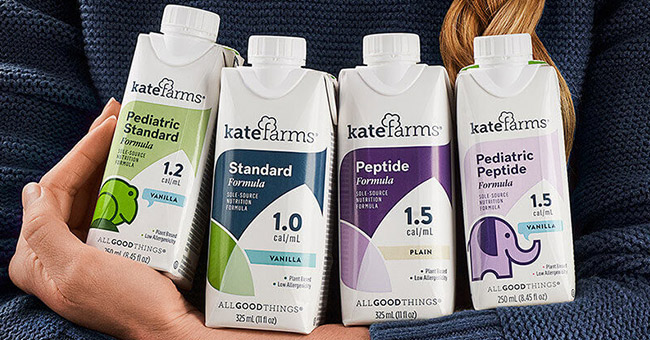Kate Farms, a California-based maker of medical grade meal replacement drinks, has raised $23 million in a Series A-1 funding round, the company announced this week, bringing its total financing to $48 million.
According to chairman and CEO Brett Matthews, the round will primarily go towards scaling company operations and increasing sales and marketing efforts. In a phone call, Matthews said Kate Farms has reported several years of triple-digit growth which is expected to continue through 2020. As well, he noted that the company has a “robust pipeline” of production innovations slated to launch later this year.
Founded in 2011 by Richard and Michelle Laver, Kate Farms was named after the couple’s daughter, who was born with cerebral palsy and uses a feeding tube. Richard Laver worked with a team of medical professionals and chefs to develop a nutritional meal replacement drink that could be used both for patients and everyday consumers.
The brand currently sells to hospitals and home care companies as well as direct-to-consumer. In addition to tube feeding formulas, Kate Farms offers ready-to-drink, plant-based nutrition formulas in Standard and Peptide varieties for adults and children, as well as its Komplete line of anytime meal replacement shakes in Chocolate, Coffee and Vanilla varieties. Each line sells online for $46 per 12-pack of 11 oz. cartons.
Matthews noted that while tube feeding formula is an important part of Kate Farms’ business, the company is looking to expand its ready-to-drink products into the medical and ecommerce channels.
“While there’s about 700,000 people fed through a tube, there’s about 150 million people who have a less severe medical condition that can buy Kate Farms directly,” Matthews said. “So that’s kind of the area of our focus right now.”
The funding round consisted of individual investors led by David Roux, co-founder of investment firm Silver Lake Partners. Former McKesson CEO John Hammergren, former WhiteWave Foods CEO Gregg Engles, former Lazard CEO William Loomis and HHV6 Foundation founder and executive director Kristin Loomis were all also included in the round, along with several existing investors and board members.
As an individual, Roux has primarily invested in the technology sector, including companies such as PrefTech, which makes software for surgical preference cards, and drone solutions firm Airobotics. Earlier this year he partnered with Northeastern University to launch The Roux Institute, which offers certificate programs in artificial intelligence and machine learning for graduate students.
Matthews said the round will likely lead to the creation of new board seats once the voting process is complete. He noted that the investors and existing board members each provide different areas of expertise to Kate Farms: Roux brings to the table experience in medical science and “financial acumen” while current board member and investor Celeste Clark, a former SVP at Kellogg’s, will help offer guidance on product development and nutrition.
“We haven’t gone the traditional VC or private equity routes, but we have worked with the limited partners of a lot of those firms,” Matthews said.
In recent years, several consumer-facing meal replacement brands have seen increased investment activity, including Soylent (which has raised $72.4 million to date), Huel ($26 million) and Ample Foods ($4 million). In contrast, the market around medical-grade products has been relatively quiet. In 2018, Swander Pace Capital acquired Functional Formularies, a maker of organic, plant-based feeding tube solutions for an undisclosed sum.
While Kate Farms has not been negatively affected by the COVID-19 crisis — Matthews noted the company sources its ingredients domestically and has not faced shortages — the company has pledged to donate $1 million worth of product to at risk populations during the outbreak. The brand is working with Meals on Wheels to deliver 250,000 meal replacement shakes in multiple states and has also partnered with local government in New York City and The Campaign Against Hunger to distribute products to senior citizens in Brooklyn.
“What’s neat about our product is it’s shelf stable, and it’s a full meal that is medical grade nutrition, so we’re happy to be able to provide this to people at risk right now,” he said.

